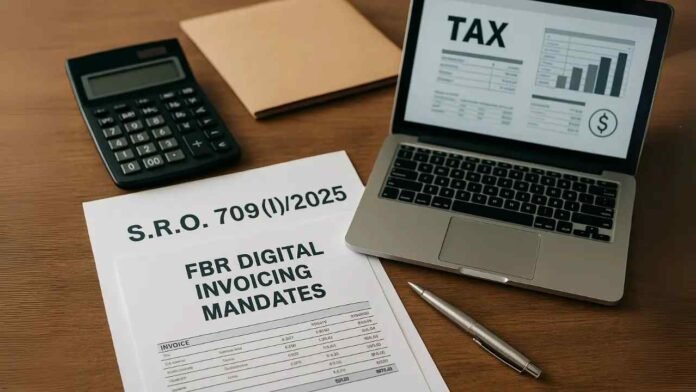The Federal Board of Revenue (FBR) has introduced a nationwide digital invoicing mechanism for sales tax–registered businesses, a move aimed at cutting red tape, ensuring greater accuracy, and curbing tax evasion.
How the New System Works
Under the new framework, corporate taxpayers will be the first to migrate, with the rest following in phases. Businesses can connect their billing software through licensed third-party integrators, while smaller firms will be able to use a free option provided by Pakistan Revenue Automation Limited (PRAL).
Every invoice issued through the platform will feature a unique identification number and a QR code generated directly by the FBR system. This real-time linkage means both buyers and sellers can instantly access their verified invoices through an online portal.
Benefits for Taxpayers
One of the biggest advantages, according to FBR officials, is speed. Businesses will be able to upload approved invoices into their tax periods with a single click, cutting down on the reconciliation time that typically drags during filing season. Automated cross-checks will also minimize mismatches and reduce the risk of penalties due to clerical errors.
The Business Intelligence dashboard gives taxpayers a complete view of invoice types, values, and counts—allowing for smarter record-keeping and better oversight.
Payment and Compliance Safeguards
The system includes tighter financial controls as well. Payments made through deposit machines or approved channels will now be credited instantly to beneficiary accounts. To prevent misuse, biometric verification is required if someone other than the account holder makes a deposit. Banks and payment operators are obligated to maintain transaction records in accordance with the law.
Standards and Privacy
Only certified invoicing machines and software will be allowed, with the FBR maintaining a public list of approved options. Any new technology not on the list must undergo testing before being cleared for use. Businesses have also been instructed to protect customer data and safeguard their access credentials to the FBR portal.
Why It Matters
Officials argue the new platform will bring multiple wins: reducing invoice fraud, improving transparency, and widening the country’s tax net. It will also provide policymakers with live economic data, helping the state conduct more targeted audits and shape better fiscal policy.
In short, Pakistan’s tax administration is betting on digital tools to close loopholes that have historically undermined compliance—and to make the process less painful for businesses that play by the rules.

